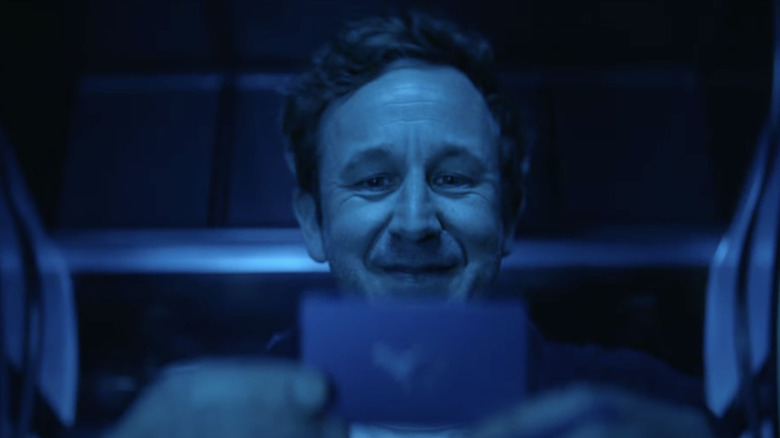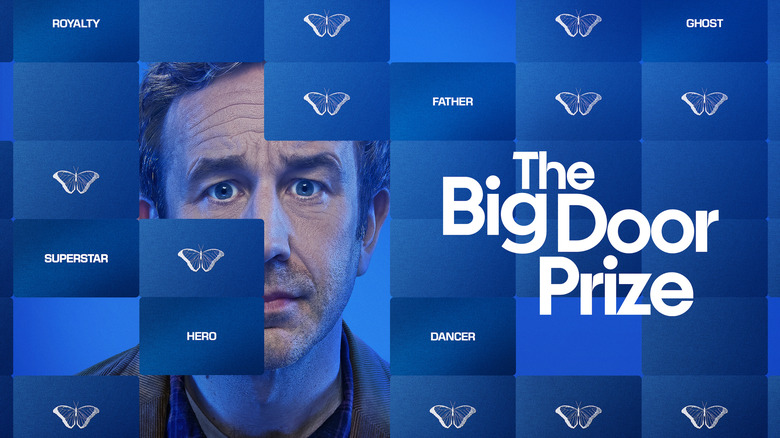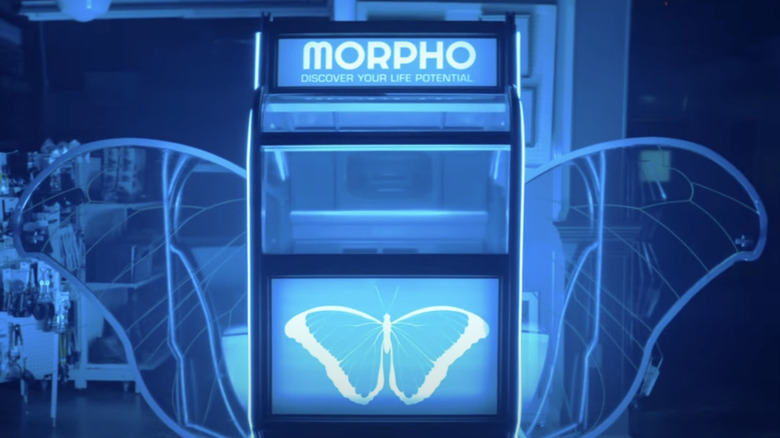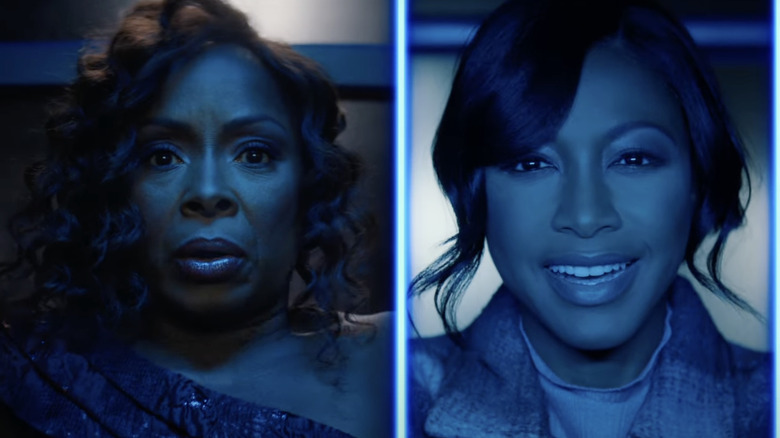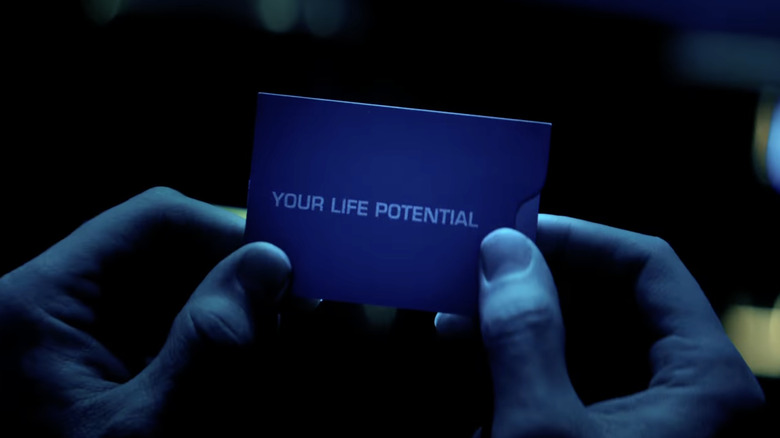The Big Door Prize's Chris O'Dowd And David West Read On Theremins, Whistling, And What Happiness Means [Exclusive Interview]
Apple TV+ bills "The Big Door Prize" as a heartwarming and character-driven comedy. That description isn't wrong, but the show based on the novel of the same name by M.O. Walsh is more than that. To say more will get into spoilers, but it will likely surprise audiences (in a good way) when they sit back and watch what happens to a small town when a mysterious machine appears that will spit out your life's potential on a neat, blue business card.
I talked with Chris O'Dowd ("The IT Crowd"), the lead of the ensemble cast, as well as showrunner David West Read ("Schitt's Creek") during the Television Critics Association winter press tour. During our conversation, we talked about theremins (a weird musical instrument you play by waving your hands through the air), but we also talked about some of the more serious themes that the show explores. Read on for that discussion.
Note: This interview has been lightly edited for clarity and brevity.
'Well, what does f****** happiness mean anyway?'
The show is really funny, and it twists your emotions in ways I don't think people will expect. David, what drew you to this project? When you saw the original material, what made you really attracted to it beyond the premise, because I think that's sort of obvious?
David West Read: Yeah, I think it was just the timing of it. A friend gave this book to me in February [2020], thinking it might be up my alley. And then the pandemic happened, and this book about what happens when you hit a pause button on life and actually stop and think about where you are, and where you thought you might be, and where you could still be ... it feels like, before the pandemic and in general in life, we were all hurtling forward without having a moment to stop and think and reassess. And then suddenly we were all stopped and thinking and reassessing. And so I just thought it was really interesting jumping off place for a series and the prescient nature of the book was really interesting to me.
And Chris, what about you? I thought Dusty is an interesting character because like all the characters, he has layers. Was that what drew you to the project?
Chris O'Dowd: From a character point of view, it was interesting to me because I play a lot of, for want of a better term, boy men — a lot of characters with arrested development who have never moved out of their more juvenile intentions. And so this is very much a character whose main conflict is more of a midlife conflict.
In lots of ways, the world is creating the same type of atmosphere that somebody going through a midlife crisis would be feeling. And that as a character trait was interesting to me because I can see loads of people around me going through that right now. And obviously, the pandemic and everything has sped that up. But even without all of that, it's a character who's a little bit older and is therefore dealing with problems that a lot of characters that I've played before don't.
And Dusty's relationship with his wife seems to be a major one within the series. And I wondered for you, when you're approaching your character's relationship with Cass [played by Gabrielle Dennis], did you and Gabrielle work together on how to approach the dynamic of their relationship?
O'Dowd: We were filming very much at what felt like COVID crazy time, so in terms of creative prep, it was tricky enough. We discussed a little where they were, which was something that we could both appreciate — that on the outside and the façade of the relationship was seemingly happy.
And then it does make you explore, "Well, what does f****** happiness mean anyway?" When those early throes of romance and sex have somewhat subsided, what is left? And I think they are probably exploring that, given a nudge by a magic machine.
'There's a kind of magic and mystery to that musical instrument that feels like it underscores the experience of the town'
That goes back to how I think the show tricks you. Because you go in thinking it's a funny show, and it is, but the emotions and the depths that it goes to is something I think will be unexpected for a lot of people. Was that something you intentionally wanted to surprise the audience with?
Read: Yeah, those are my favorite kinds of comedies — the more grounded comedies that allow for dramatic and slightly more serious moments and slightly heavier topics. This show touches on grief, fidelity, anxiety, depression, faith — some of the bigger questions. But I think that's what, again, drew me to the premise as a jumping-off point. There's just so many directions that you can go with it, with how people could respond to this machine.
And with testing Cass and Dusty's relationship, it helps anchor this series because you don't explore every single story in this town. So you're trying to root it in a relationship that almost stands in for the town as a whole — a couple that's experiencing friction based on one person being given a very aspirational potential and the other person saying, "No, you've kind of reached your peak." The fracture in their relationship stands in for the split in the town.
And going back to the book — I know it was a starting off point, and you said in the panel that you didn't feel like you were beholden to the source material. And I know there are at least some changes — it's still a small town, for example, but I think it was a southern town in the book. And I think Dusty got a trombone in the book and in the show he got a theremin. What was your process like in changing things from the book to meet the needs of the series?
Read: Well, I mean, in general, I think the book is set in a small town in Louisiana, which is very geographically specific, and there are political ramifications to setting it in one specific part of America. I like the idea of this town being a bit of a bubble that could be any town, so that our themes could be more universal. And then I really enjoy things that are just slightly left of center. So for Dusty's midlife crisis, instead of a convertible and an electric guitar, it's a scooter and a theremin.
And the theremin for me is such a perfect kind of metaphor for what he's going through, where it's this mysterious device. You don't really know how it works. You can't really see it working, but when you use it, you're reaching your hand into an unknown space and making contact with something, with electromagnetic waves. And there's a kind of magic and mystery to that musical instrument that feels like it underscores the experience of the town.
'It's more of a scream by the end'
And Chris, without getting into spoilers, your character is a great whistler. Did you have to practice whistling at all for the part?
Read: He's a good whistler.
O'Dowd: We were talking about that a little bit. We got a professional whistler in because some of that stuff we were talking about doing was quite complicated. And I felt like I'll do my own stunts but not my own whistles. I don't know if you can train yourself to be a great whistler.
What did the consultant teach you, like the mouth shape? Or did he dub for you?
O'Dowd: No, he dubbed, yeah. remember watching a lot of YouTube videos for the theremin and the scooters. There was actually a few little tasks here and there to learn for this part. But there is a lot of s*** on YouTube about tongue placement and all of that kind of stuff for whistling. But it really speaks more to the idea that Dusty could whistle his way through life, and thinks that he has been, is significant. It's more of a scream by the end.
I wanted to talk a bit about casting. The entire cast is great and they all bring so much to their roles. Can you talk about the casting process and how you got in the core group?
Read: I mean, this is an incredible ensemble, I think, and that is important because the show has this unique thing of focusing on a different character with each episode, even though the overarching story moves forward. So there's a real pleasure for me in casting people who in the first couple of episodes might seem like they're more supporting, background characters and then they move more and more into the spotlight themselves.
But we started with Chris. This is awkward because he's sitting beside me, but what I love about Chris is that he's so naturally charming and funny, but he's also a really good actor. And I wanted to have the ability to go deep with this character because there's a version of this show that is much more like a standard sitcom. But with someone like Chris, there's the latitude to just head in every different direction. And starting with him and building the cast around him, we applied that same principle of, "Let's find people who have the most tools in their kit so that we can go anywhere we want with the show."
And I love that there's a lot of people who might not be well known to the audiences before the show, so you meet them as real people in this town and I hope will be blown away by how great they are.
Yeah, the actors who play the two high school kids [Djouliet Amara and Sammy Fourlas] are fantastic.
O'Dowd: It's one of the first casts I've been on where ... they're a lovely bunch, but they're also all from different backgrounds in a creative sense, which is so cool. So you've got old theater New York people and TikTok people, and European f****** like me and all of that. It's a nice vibe to see people come to the same material from very different experiences.
Read: Yeah. The actress who plays Chris's mom is only in one episode. She's won the Tony Award for Best Actress. And then you've got Sammy [Fourlas, who plays the high school student, Jacob], who's a TikTok star. He's never done TV before and he's unbelievably great on this show. So it really is this hodgepodge of people from all different backgrounds and experiences, but I feel like it's part of what's special about it.
So for Sammy, I had no idea he was on TikTok. How did you find him?
Read: I think he had representation from being on TikTok. And he just sent a tape, like everyone else. The other part of the casting process is once you see the person, you start to panic because then it's like, "What if we can't get this person now that I've seen them?" And Sammy was like that. As soon as we saw him, it was like, that's Jacob.
'It's a comedy that asks some pretty big questions that doesn't provide easy answers'
I know the show premiers in spring. In the lead up to that, what do you want folks to know going into the show to get them interested or excited about watching?
O'Dowd: If you feel like you're looking around and everybody seems like they're being very easily led, then this is the show for you. It is an exploration in lots of ways, of how society can be cajoled into the idea of expertise or knowledge. And we can see it happening all over. And so it's fun to watch a microcosm of that in a really fun show.
Read: I think it's a comedy that asks some pretty big questions that doesn't provide easy answers. And I think it stays with you, hopefully, when you watch and makes you think about things in your own life. But it's also just a town and a group of people that you want to spend time with. We created this really special place, Deerfield, and there is an escape in the show where you can spend time in this town that has this slight magic eerie quality ,and it really is a genre mishmash and hopefully unlike anything else people are watching.
"The Big Door Prize" premieres on Apple TV+ in Spring, 2023.
